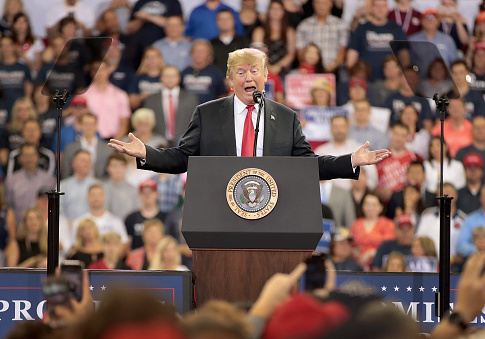What's your favorite political cliché? Mine is the quip of former Speaker of the House Tip O'Neill: "All politics is local." Might be true for congressmen, whose longevity in office depends on the attention they pay to their districts. But it fails to capture the reality of 21st century politics, in which presidential authority, the courts, and national media overwhelm all else. And the idea of all politics being local has been especially wrong for the last three years. Since June 16, 2015, all politics has been neither local nor national. Today, all politics is Trump.
Read the recent survey from the Pew Research Center. It finds high enthusiasm among voters for the midterm election. Overall, 51 percent of registered voters say they are more enthusiastic than usual about their votes. Democrats are running hot—55 percent of them say they are more amped than before. But Republicans are not far behind: Fifty percent say the same. And both Democrats and Republicans are following the news closely. The question of who controls Congress next year is driving votes.
Why? "Trump," says Pew, "is a bigger factor in midterm voting preferences—positive or negative—than any president in more than three decades." Sixty-one percent of Democrats see their vote as a vote against President Trump. A majority of Republicans see theirs as votes for him. Taxes, immigration, trade, and foreign policy have been subsumed into a larger phenomenon: the Trump phenomenon. One's vote is conditioned not by any particular macroeconomic or geopolitical issue. What matters is one's attitude toward Trump.
No president in memory has so dominated politics, culture, and the world. Even language is not immune to his influence. Think of the phrases he has embedded into political speech: Make America Great Again, Build the Wall, Fake News, Space Force. The celebrity Obama, who sought to rebuild America on a new, government-centered foundation, grows ever more distant. He fades into the background as Trump demolishes his work and builds over it with the good marble.
Trump looms larger than Obama in the media landscape despite coverage that is overwhelmingly hostile to him. His mastery of publicity, generation-long status as a cultural reference, and more than a decade on television collapsed the always-fuzzy distinction between politics and entertainment, and folded campaigns and elections into reality television and tabloid media. He is the subject of tirades and threats from Hollywood dinosaurs, the brunt of protests from NFL and NBA athletes, the beneficiary of compliments from Kanye West. In the Beltway where I live and work, Trump is insulted, impugned, condescended to, complained about, and sniped at in the most feverish, moralistic, exaggerated prose. But travel to a MAGA rally, and you encounter an energy and devotion seldom enjoyed by elected officials.
Trump's polarization of the electorate explains a lot. He has a unique way of distorting the field, of making it impossible to see anything but his looming figure. His opponents describe life in America as a waking nightmare, a raging dumpster fire, even as joblessness hits record lows, incomes rise, food stamps and disability rolls shrink, and Americans express satisfaction in the present and confidence in the future. Democratic enthusiasm and the fury of the anti-Trump Resistance have prompted media speculation of a coming "Blue Wave," but currently Trump's approval rating and the congressional generic ballot make it difficult to guarantee Democrats will control the House, much less the Senate, next January. Official Washington fixates on Trump rather than the imperfections in American economy, society, culture, and foreign policy that it neither recognized nor addressed in time to prevent his rise.
Trump's gravitational pull is such that he causes his opponents to overplay their hands. In effect, he trolls them into adopting positions so far out of the mainstream that they become self-discrediting. Take, for example, the crisis at the southern border. With the policy of family separation, Trump found himself on the wrong side of a 70/30 issue. His administration spent a lot of time explaining, which in politics means you are losing an argument. But within days the president went on offense by signing an executive order and urging Congress and the courts to regularize asylum and detention law. The Democrats? They quickly found themselves arguing for releasing anyone who crosses the border illegally with a child—not only a dumb idea, but also one that would incentivize future crossings and even child trafficking. It's unpopular to boot.
Yet his centrality to American politics is not entirely to Trump's benefit. The spotlight on his controversies, missteps, scandals, and Tweets may divert attention away from policies that in another Republican administration would have caused major protest. But it also explains the relative inattention to the economy and his popular diplomacy with North Korea. Trump pushes suburban women with college degrees clustered near metro areas away, even as he pulls blue-collar workers and rural voters toward him. The result may be a Democratic House whose grand inquisitor, Jerry Nadler, would be relentless and without pity. Then there is the larger question of what America might look like after four—and very possibly eight—years of Trumpitude.
It's an unanswerable question of course. When all politics is Trump, politics assumes Trump's characteristics. And so these unpredictable, tumultuous, news-intensive days are in large part the consequence of the president's own impulsivity, improvisation, strategic ambiguity, off-the-cuff style, frenetic activity, and dizzying speed. The rush of events won't stop until he does. And he's not about to stop.
